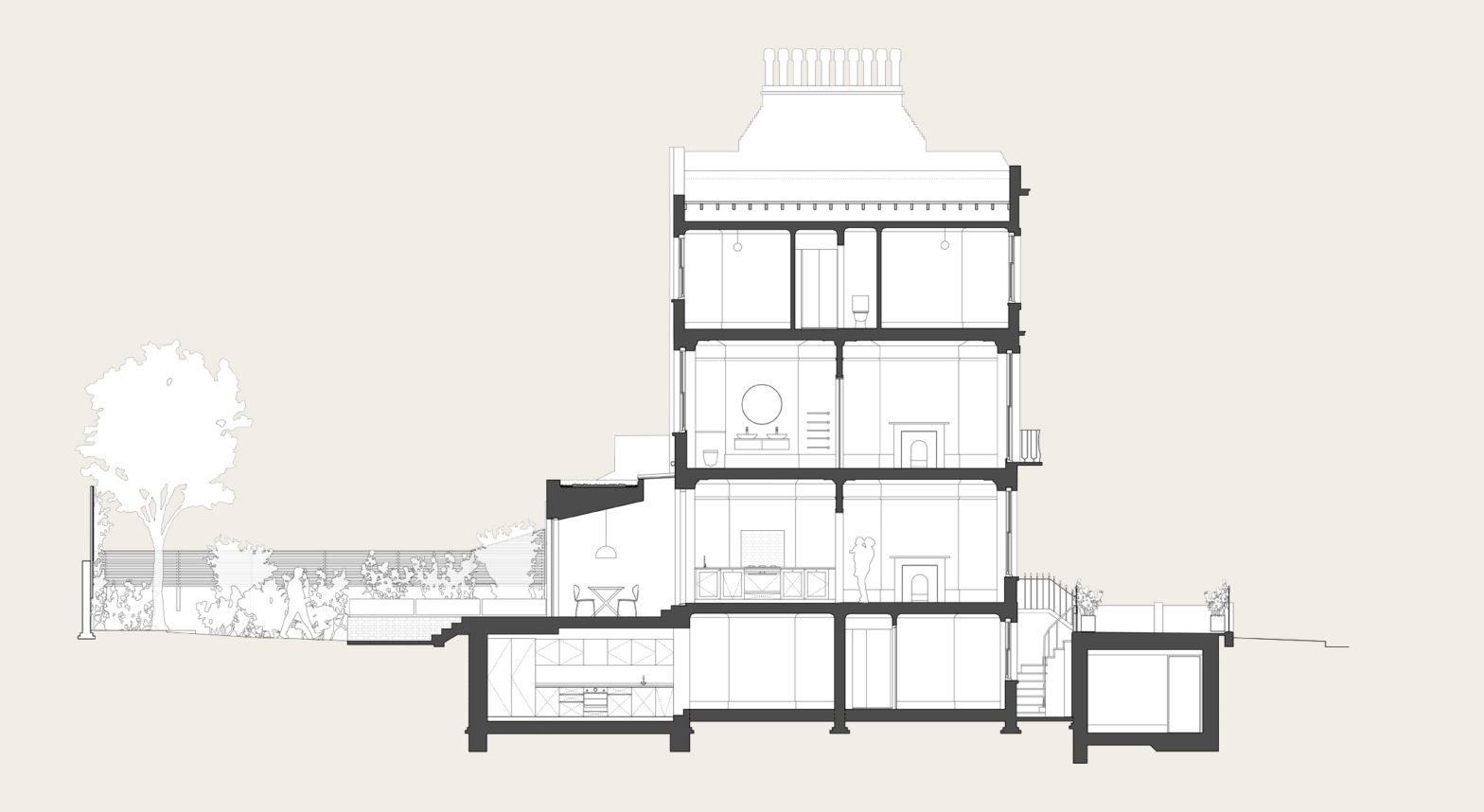
As part of a recent planning application, we were required to undertake a Basement Impact Assessment (BIA) for a 1.2m extension to the front garden coal holes of a Listed Georgian terraced house in the London Borough of Camden (LBC). Although this was a tiny lower-ground floor extension, the requirements were extremely onerous, so we would like to share the process to give you fair warning!
LBC have a one-size-fits-all policy towards basements and do not offer concessions for smaller schemes. In a time of council cuts, it seems counter-intuitive for LBC to be reviewing hundreds of pages of reports for a simple extension that clearly has minimal impact on the adjoining properties.
Last year, we went through an extensive (3-month) pre-application consultation with LBC, during which they told us that we need only undertake the screening stages of a BIA as defined in CPG4. We were told that due to the limited nature of the works, our proposals fell within a Category A development. On the decision date of our planning and listed building applications, we were informed that our proposals actually fell within Category B development, which meant that a full BIA now needed to be undertaken. This resulted in additional costs to the client and delays to the overall project programme (3-months at time of writing).
In the case of our project, the delays and costs were worth bearing. The alterations would allow an additional bedroom and en-suite, raising the value of the property. In many cases, it won’t be worthwhile to go through a BIA, so the costs and requirements of a BIA must be understood from the outset.
If you are considering any alterations to a basement within LBC we would recommend the following:
- Try to avoid basement works!
- Review LBC’s planning guidance document ‘CPG4 – Basements and Lightwells’ to get an overview of the planning policy, design guidance and process for basement applications.
- Undertake a pre-application consultation with LBC to review your scheme and define which BIA category your proposals fall within. At this stage, LBC should be able to give you an indication of their fees. In addition to the planning application fees, you must pay LBC to undertake an audit of your submitted BIA reports.
- Review LBC’s ‘BIA Terms of Reference and Audit Process’ document, which defines the BIA categorisations, processes and fees involved in more detail than CPG4.
- Make your client aware (from the outset) of the number of consultant’s reports required, costs and timescales (refer to CPG4). For example, our BIA required:
- A Basement Impact Assessment overview report (structural engineer).
- Full structural design drawings and calculations (structural engineer).- A Construction Method Statement (structural engineer).
- A Ground Investigation and Assessment (hydrogeologist).
- A Ground Movement Assessment (structural engineer).
Further reports such as; a Traffic Management Report, Construction Management Plan and Sustainable Urban Drainage Strategy may also be required for larger schemes.
- In addition to the BIA and subsequent Audit, our client was required to agree to (and pay for) several S106 Heads of Terms including:
- A ‘Construction Management Plan’ (CMP) based on LBC’s pro-forma, which includes; Noise/Vibration Survey and Assessment, Dust Risk Assessment, Traffic Management Plan, Community Consultation, Asbestos Survey, CLOCS Agreement (Cycle Safety). LBC’s guidance on the CMP states that developers should allow 3 months for this to be reviewed and agreed. Again, this is quite an involved and expensive process.
- An ‘Approval in Principle’ from LBC Highways department which requires a report from a structural engineer to show that the proposals will not have any adverse structural impacts on the nearby highway. A template for this report can be found in Annex A of the BD2-12 ‘Design Manual for Roads and Bridges’.
- A ‘Highways Contribution’ to pay for any potential damage to the footway caused by our works (payable up-front).
- Various ‘Contributions’ for LBC to assess these Heads of Terms and their legal fees.
- During the works our client will need to undertake:
- Continuous noise/vibration monitoring during the demolition and excavation work stages, to ensure noise levels do not rise above those predicted in the noise assessment.
- Continuous movement monitoring of the neighbouring structures, to ensure the works do not result in movement of more than 5mm of the neighbouring structures.
- Neighbour notifications of anticipated dates of noisy works.These will add additional contractor’s preliminaries to the overall contract value.
- Consider that the Party Wall Awards will be more complicated and expensive for any basement works.
The increase in planning costs for this project were approximately £23k. £13k of which was payable to various departments within LBC, the rest was for the various consultant’s reports.
In this instance, we did not charge for our additional architectural/project management work as we felt that our client had already had the book thrown at them. In the future, we would have to consider it in our fee quotation.
We felt that many of LBC’s requirements were far too onerous and excessive for a small residential extension such as ours. We raised our concerns with LBC, but have not had a response. We will send a more direct letter following the planning decision date and final agreement of the S106. To us it is worth ensuring that the council fully understands the burden that they are putting on household applicants, not just developers.
If you are considering a basement extension in LB Camden (or in the many other London boroughs that now require BIA’s), you have been warned!
Do you have any opinions/stories on BIA’s? Share your thoughts on Facebook or LinkedIn.
* Note: All information shared was relevant at time of writing (March 2017) but may have changed since. This is an opinion piece and should not be taken as formal advice. As always, professional advice should be sought before undertaking project work.